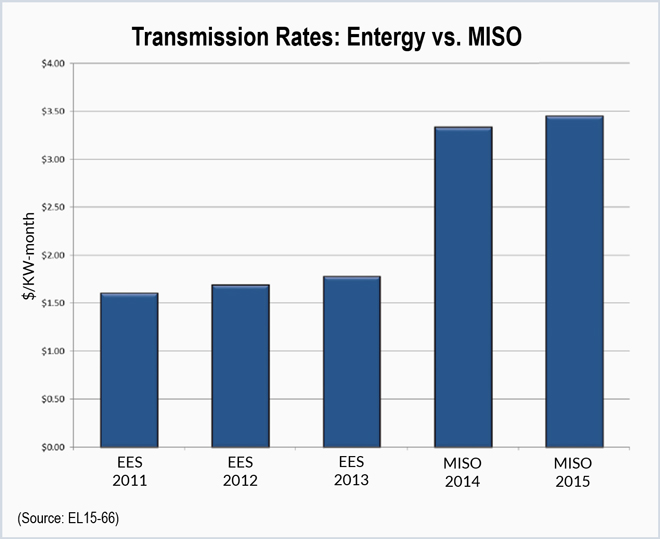By Chris O’Malley
MISO asked the Federal Energy Regulatory Commission to dismiss a complaint filed last month alleging it billed more than $21 million in excessive transmission rates, saying Southern Co. and three Missouri utilities have misinterpreted its Tariff (EL15-66).
MISO transmission owners, which joined the RTO last week in asking for dismissal, were blunter, saying the utilities’ claims amount to “misrepresentations” of the Tariff.
Both maintain the utilities’ complaint is duplicative to a proceeding already underway before FERC that involves similar issues (EL14-19).
In their complaint filed last month, the utilities alleged that MISO improperly shifted and reallocated sunk costs and network upgrade costs from its legacy region in the Midwest to Entergy export customers in the South following Entergy’s integration into MISO in 2013. (See Utilities Accuse MISO of ‘Massive’ Overcharges.)
Bringing the case were Kansas City Power & Light’s Greater Missouri Operations Co., The Empire District Electric Co., Associated Electric Cooperative Inc. (AECI) and five Southern Co. affiliates: Alabama Power, Georgia Power, Gulf Power, Mississippi Power and Southern Power.
Entergy Integration
The utilities were receiving transmission service from Entergy before it joined MISO under the terms of the Entergy Tariff. When MISO succeeded Entergy as the transmission provider, they became subject to MISO’s Tariff.

Long-term, firm point-to-point transmission service rates under the Entergy OATT vs. MISO OATT.
The utilities contend that MISO’s drive-out and drive-through charges are not applicable to their transmission service reservations and that if they were applicable they should be declared unjust and unreasonable. They claim that Attachment FF-6 of the MISO Tariff provides a broad exemption for their through-and-out transaction charges. They say the allocations violate MISO’s Tariff and FERC findings that — with the exception of certain multi-value projects — point-to-point export services are provided under a no-cost-sharing rule.
Exemption Argument
In its response, MISO counters that the Tariff is clear that the utilities are not entitled to an exemption. The RTO maintains that FERC “has confirmed on several occasions” that through-and-out rates in question are applicable to transactions in the MISO South region.
“Over the past several years, the complainants have created an extensive paper trail in various proceedings, which casts doubt on their current Tariff violation claims. While the complainants have filed numerous pleadings to block and devalue the MISO South integration, those pleadings did not argue, until the instant complaint was filed, that MISO is violating the Tariff,” MISO said. “On the contrary, the complainants sought FERC action precisely because these rates were applicable.”
The RTO also said any dispute over its through-and-out rate should be resolved in the section 206 proceeding FERC initiated in February 2014 (EL14-19).
Increased Scope
MISO also said the fact that the charges may have increased does not render them unjust and unreasonable. Prior to the MISO South integration, service was limited to the Entergy transmission system. But now the utilities may redirect points of receipt or delivery on a region-wide basis, MISO counters.
“Not surprisingly, the complainants’ new charges reflect these benefits of scope, as well as many other unique benefits that a Day 2 RTO provides to its customers,” MISO said.
Finally, MISO contends that the utilities are seeking a preferential rate at the expense of other market players.


